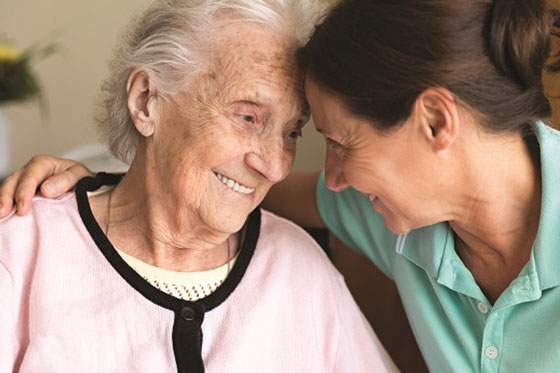Did you know that 1 in 9 people ages 65 and older has Alzheimer’s disease? Alzheimer’s changes the way that your loved ones communicate. Some caregivers may not see very many differences, but others may notice that it becomes increasingly difficult to communicate with loved ones with Alzheimer’s.
There are some common communication changes that caregivers may notice as Alzheimer’s disease progresses. You might hear your loved one repeating familiar words, speaking in their native language or mixing up the order of words in a sentence. They may also have trouble communicating their feelings or speak less often than usual.
Here’s a few quick tips for communicating effectively with your loved one with Alzheimer’s or dementia:
1. Watch non-verbal communication.
It is often hard for those with Alzheimer’s or dementia to communicate what they’re feeling. Instead of talking about their feelings or illnesses, they resort to non-verbal cues. Symptoms like a headache may come out as a different behavior like rocking in a rocking chair or pacing around the room. Or, if they feel threatened by someone in the room with them they could start to withdraw, bend over in their chair or cross their arms and legs. They feel insecure about not knowing how to communicate their feelings and that insecurity turns into a physical response.
2. Don’t get stuck in repetition.
When you notice that your loved one is continually repeating words or stories, you have to do something to break the communication cycle. The best way to break the cycle is to do something physical. Get them up and moving—maybe brushing their teeth or hair, helping with a project or folding laundry.
3. Don’t try to constantly bring them back to the present.
While it may be helpful to remind them of the date or current events at times, it is not necessary to do it every time your loved one is confused. Try to communicate with them where they are instead. The easiest way to do that is to use simple, direct sentences like “time to go upstairs and go to bed” or “it’s time for dinner; take a seat at the table.”
4. The key to great conversation is the past.
Talk to your loved one about events and things that happened in the past. Conversation will begin to flow easily. Many of their memories are from the past and it is fun for them to reminisce about times that they remember so clearly.
Communicating with loved ones who have Alzheimer’s or dementia can be frustrating, but with some adaptations, communication can be enjoyable again. People with dementia do not remember who you are but they do remember how you make them feel! Make them feel purposeful so they can have a wonderful feeling today and every day. What are some tips you have for other caregivers or family members that are caring for loved ones with Alzheimer’s or dementia?
